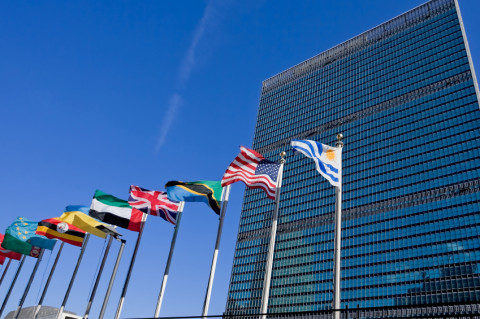UN Body Announces $25m Multi-year Resilience Programme In Cameroon
African News, Latest Headlines, News Around Africa, West Africa Sunday, July 31st, 2022
(AFRICAN EXAMINER) – Education Cannot Wait (ECW), the United Nations global fund for education in emergencies and protracted crises, has announced a new $25 million catalytic seed funding to roll out a first-ever Multi-Year Resilience Programme in Cameroon.
ECW supports quality education outcomes for refugee, internally displaced and other crisis-affected girls and boys, so no one is left behind. The organization also works through the multilateral system to both increase the speed of responses in crises and connect immediate relief and longer-term interventions through multi-year programming.
ECW works in close partnership with governments, public and private donors, UN agencies, civil society organizations, and other humanitarian and development aid actors to increase efficiencies and end silted responses
The new allocation brings ECW’s total investments in Cameroon to over $30 million to date to reach crisis-affected girls and boys with quality education.
The $25 million investment delivered in partnership with Government of Cameroon, UN agencies and civil society seeks to mobilize an additional US$50 million in funding to reach 227,000 crisis-affected girls and boys, refugee, returnee and host community children and adolescents within the North-West, South-West, Far North, East and Adamawa regions.
In line with ECW’s other multi-year investments, 60 percent of beneficiaries are girls and 10 percent are children with disabilities.
The multi-year investment will be delivered by a consortium of grantees, including the Norwegian Refugee Council ($3 million), Plan International ($3.2 million), UNESCO ($3.5 million), UNICEF ($6.8 million), UNHCR ($5.6 million) and the World Food Programme ($2.9 million) in alignment with the Government of Cameroon’s plans for education in the crisis-affected parts of the country.
The investment responds to the multiple shocks Cameroon has experienced over the last decade, including numerous prolonged humanitarian crises and resulting population movements, socio-political crises, recurrent flooding driven by climate change in the Far North region, the Boko Haram Lake Chad Basin regional crisis, protracted conflict in neighboring Central African Republic, and compounding impacts of COVID-19.
The most recent analysis indicates that more than 1.9 million school-aged children in the country require urgent humanitarian assistance. More than 1.2 million need urgent assistance in the North and South-West alone, and close to 400,000 need assistance in the education sector in the Far North.
Director of ECW, Yasmine Sherif SAID The children and adolescents of Cameroon need this multi-year investment in their education more than ever, adding that it provides a holistic quality education, including psychosocial services and school meals.
“It is well-coordinated and implemented jointly between UN agencies and civil society under the leadership of the Ministry of Education. This is precisely the kind of investment the world needs to focus on to make a difference where it is the most needed. We call on donors, the private sector and other strategic partners to urgently mobilize additional resources to realize the dreams of quality education for the children and adolescents in Cameroon.
“Together, we can advance progress towards SDG4: ensure inclusive and equitable quality education and promote lifelong learning opportunities for all. This is the bedrock to achieving all other Sustainable Development Goals”, she said.
Cameroon’s Minister of Education, Professor Laurent Serge Etoundi Ngoa noted that at a time when reflections on the transformation of education are underway, the Multi-Year Resilience Programme funded by ECW, will make it possible to strengthen the resilience of their education system and increase opportunities for all girls and boys affected by the various crises raging in Cameroon to access a quality inclusive education in a healthy, safe and protective environment.
With an emphasis on investments in gender equality, disability inclusion, and mental health and psychosocial support, the multi-year programme will increase the capacity of the national education system to plan, monitor, coordinate, finance and deliver quality educational responses in crisis-affected areas.
In addition, it spans the continuum from early childhood education to adolescent skills programming and includes a focus on adolescent girls’ secondary education as well as non-formal alternative education.
The programme builds on the impact of ECW’s US$5.2 million in First Emergency Response grants in Cameroon, which responded to the immediate needs of children and adolescents during the on-set of various crises, the COVID-19 pandemic and influx of refugees from the Central African Republic.
Related Posts
Short URL: https://www.africanexaminer.com/?p=79360






















